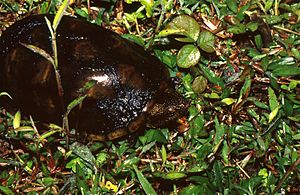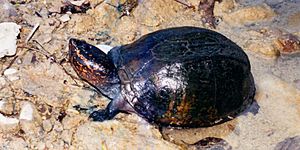Scorpion mud turtle facts for kids
Quick facts for kids Scorpion mud turtle |
|
|---|---|
 |
|
| In Alajuela Province, Costa Rica | |
| Conservation status | |
| Scientific classification |
|
| Kingdom: | Animalia |
| Phylum: | Chordata |
| Class: | Reptilia |
| Order: | Testudines |
| Suborder: | Cryptodira |
| Family: | Kinosternidae |
| Genus: | Kinosternon |
| Species: |
K. scorpioides
|
| Binomial name | |
| Kinosternon scorpioides (Linnaeus, 1766)
|
|
| Script error: The function "autoWithCaption" does not exist. | |
Script error: No such module "Check for conflicting parameters".
The scorpion mud turtle (also called the Tabasco mud turtle) is a cool type of mud turtle. Its scientific name is Kinosternon scorpioides. These turtles live in warm places like Mexico, Central America, and South America. They are medium to large turtles with a round, dome-shaped upper shell. Their shell can be from about 9 to 27 centimeters (3.6 to 10.6 inches) long. Male turtles often grow bigger than 20 centimeters (8 inches).
Scorpion mud turtles love water and can live in almost any watery place. They eat many different things, making them "omnicarnivores." This means they eat both meat and plants. They enjoy munching on water insects, spiders, shrimp, crabs, snails, worms, fish, and frogs. They also eat dead animals and even bird eggshells. For plants, they like algae, fruits, flowers, nuts, seeds, and other water plants. Female turtles usually lay 1 to 6 eggs with hard shells. They often build a simple nest on land, not too deep.

Contents
Types of Scorpion Mud Turtles
There are different kinds, or "subspecies," of the scorpion mud turtle. Each one has slightly different features or lives in a specific area.
Common Scorpion Mud Turtle
This type is called Kinosternon scorpioides scorpioides. It was first described by Carl Linnaeus in 1766.
White-Throated Mud Turtle
This subspecies is known as Kinosternon scorpioides albogulare. It was described by Duméril and Bibron in 1870. It might have a lighter throat area.
Red-Cheeked Mud Turtle
The Kinosternon scorpioides cruentatum is another subspecies. It was described by Auguste Duméril, Gabriel Bibron, and André Marie Constant Duméril in 1851. This one might have reddish markings on its cheeks.
See also
 In Spanish: Tortuga Estuche para niños
In Spanish: Tortuga Estuche para niños
 | Janet Taylor Pickett |
 | Synthia Saint James |
 | Howardena Pindell |
 | Faith Ringgold |


